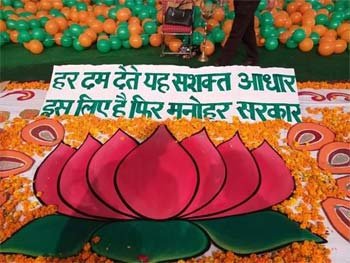With a view to improve the standard of cleanliness, Indian Railways have planned multi-pronged action by synergizing technology, education of users and provision of mechanised equipments. Various measures taken include introduction of mechanized cleaning process, award of rag picking/garbage disposal contracts, pay & Use toilet scheme etc. Besides, inspections by various officials at the railway stations are also conducted to monitor cleanliness, to identify weak areas and take remedial measures. Additional posts of Health Malaria Inspectors have been created during the last four years to ensure better supervision of cleanliness at railway stations.
Constant efforts are being made to improve the level of cleanliness in coaches. Following initiatives for improvement of hygiene and cleanliness in the trains have already been taken:
Intensive Mechanized cleaning of coaches in the coaching depots through professional agencies is being carried out. Heavy duty machines such as high pressure jet cleaners, floor scrubbers, vacuum suction cleaners etc. are deployed for the purpose.
Presently a total of 115depots have been identified for this work and this has alreadybeen implemented in 89 coaching depots on different Zonal Railways.
On Board Housekeeping Scheme (OBHS) has been prescribed in all Rajdhani, Shatabdi,Duronto & other important long distance Mail/Express trains for frequent cleaning of coach toilets, doorways, aisles & passenger compartments during the run of the trains.
A total of 535 trains have been identified for providing OBHS services. This scheme has been implemented on about 335 pairs of trains.
Clean Train Station scheme has been prescribed for limited mechanized cleaning attention to identified trains during their scheduled stoppages enroute at nominated “Clean Train Stations” with focus on cleaning and disinfecting of toilets, doorways and aisles. 30 Clean Train Stations have been nominated by Railway Board on different Zonal Railways. 28 of these have been commissioned and are functional.
Setting up of mechanized laundries for washing linen: 54 locations have been identified to set up Mechanized laundries for improving the quality of washing of bed rolls.While 29 Nos shall be managed departmentally, 21 Nos are being outsourced. Mechanized laundries have already been set up at 16 locations. Contracts for setting up laundries at 7 locations are in advanced stage and tender are under process at 12 locations.
Pest and rodent control in trains: The contract for pest and rodent control in coaches is already in place in 125 coaching depots out of 127 identified coaching depots on IR. To improve effectiveness of the pest and rodent control, measures are being regularly reviewed. Major constraint is vulnerability of coaches for entry of pest and rodents at coaching depots, station yards etc.
Monitoring of weak areas will further strengthen to achieve higher standards of cleanliness on the trains.
Cleanliness at Stations
In view of the high density of passenger traffic, maintenance of cleanliness at stations is a major challenge for Indian Railways. However, Indian Railways accord very high priority for ensuring proper standards of cleanliness at stations.
The steps taken to improve cleanliness at railway stations are as under:
- More and more mechanical cleaning gadgets are being introduced and better types of cleaning agents are being used to achieve improved standard of cleanliness. Contracts are given for supply of machines like scrubbers, high pressure jet cleaners, mops, etc. Railways are also providing washable aprons (Ballast less track) on platform lines at railway stations with jet cleaning arrangements.
- Periodic contracts for rag picking and garbage disposal are awarded.
- Cleanliness awareness campaigns are also launched for education of the rail users to ensure a satisfactory level of cleanliness at railway stations.
- Powers have been delegated to Divisional Railway Managers (DRMs) for purchasing of tools and plants required for carrying out various sanitation related activities, awarding of pest control contracts, specialized contracts for mechanized cleaning and one time cleaning.
- The Station Superintendents/Station Managers are provided with adequate cash imprestexclusively for cleaning of approach to station.
- A monitoring and reporting system has been developed and the action taken by Zonal Railways for improvement in cleanliness is reported on weekly and monthly basis for Board’s appraisal.
- Inspections are conducted at various levels viz. General Managers, DRMs, Service Improvement Groups and at other Officers level to check the standard of cleanliness at various stations. During these inspections, deficiencies are noticed in various areas such as drainage, availability of dustbin, sewerage, water supply, washable apron and garbage disposal. Steps are taken to wipe out the deficiencies so noticed.
More and more toilets are brought under the purview of ‘Pay & Use’ toilets, including deluxe toilets. At present, more than 850 stations are provided with normal ‘Pay & Use’ toilets and more than 30 stations are provided with Deluxe ‘Pay & Use’ toilets on Indian Railways.
Medical Department has been entrusted with the job of sanitation at some stations in some of the Zonal Railways. To improve the cleanliness standards, the following steps/measures are being taken by the medical department:
- Increased mechanization that is by way of utilizing machines such as Scrubbing, Sweepers, High Pressure Water Jets, Vacuum Cleaners, Wet and Dry moppers etc are being increasingly used.
- To cope up with the increased work load, the work is being outsourced at the major stations by giving contracts i.e. Rag Picking Contracts, Mechanized Cleaning Contracts, Garbage removal contracts.
- Services Inspection Groups (SIG) groups consisting of Senior Officers of Commercial, Engineering and Medical Departments regularly inspect the stations to monitor the cleanliness levels
*******
*Deputy Director (Media & Communication), Ministry of Railways.















